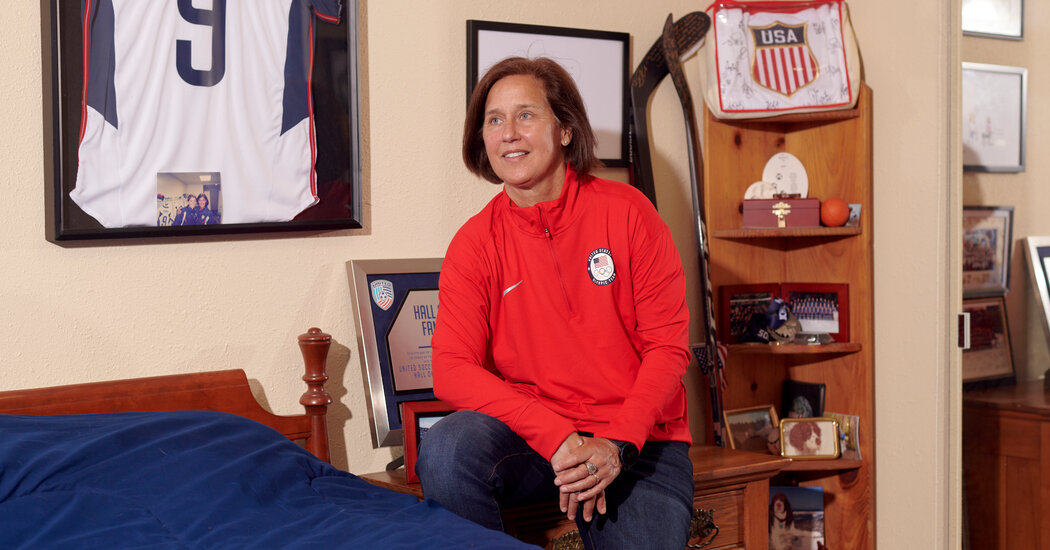
An Athletic Coach for the Mind?
08/06/2021When you imagine an Olympic athlete preparing for competition, you might picture them doing typical athlete things: running in place, stretching, making circles with their arms and wrists.
In Tokyo, many athletes on the U.S. team have added another routine to their pregame checklist — virtual or in-person check-ins with an on-call mental skills coach.
Colleen Hacker, a psychological consultant who has coached America’s top athletes for more than 25 years, fields rapid-fire inquiries via Zoom, text and email from her Olympic clients at all hours. From her home in Tacoma, Wa., she counsels them on things like how to avoid choking under pressure, how to tune out media chatter and how to quell stomach butterflies.
While regular coaching might involve leading athletes in repetitive drills and scrimmages, mental skills coaches supply athletes with a suite of psychological tips and tricks to instill a winning mind-set, like sharpening on-field focus, brushing up confidence and winnowing distractions.
Mental skills training is “a combination of counseling, support and coaching,” said Brian Alexander, a San Diego-based mental skills coach who is also working with Olympic athletes in Tokyo. “It’s teaching the foundational skills that train your brain to perform under pressure.”
And many of the best are skilled translators, who cull the latest research for ideas and then convey them to clients in a direct, memorable way. “You can have all the science, all the evidence-based tools in your arsenal,” said Jean Williams, an Arizona-based sport psychologist who has worked as a mental skills consultant. “But you also have to have the personality to be able to deliver them.”
Mental skills coaching has been around since the early 20th century. One of its pioneers, the sport psychologist Coleman Griffith, helped boost the mental readiness of the Chicago Cubs in the 1930s. But in recent years, the field has gained more recognition as scientific research has demonstrated its benefits.
Today, hundreds of elite-level athletes and teams — from swimmers to field hockey players to those in the N.F.L. — work with mental skills coaches. And many Olympic athletes have credited them for their success.
Here are some of the strategies mental skills trainers teach, and how to apply them to your own life.
Let your imagination run wild.
One of the most popular mental skills techniques is imagery training, where athletes picture themselves executing key plays — driving a soccer ball toward a goal or reeling off a flawless dive — in the hours, days, weeks and months before a big competition while calling the sounds, smells and atmosphere of competition to mind.
Latest Updates
When Dr. Hacker worked with the 2018 women’s Olympic ice hockey team, she had them repeatedly imagine specific moves they’d need to perform in competition. To make this mental rehearsal more realistic, Dr. Hacker sometimes asked players to do it at the arena while wearing their uniforms, gripping onto their sticks, and inhaling the smell of the ice rink — but not necessarily moving their bodies.
Regular practice of this type of sensory-based imagery technique, some studies suggest, can in some cases improve sport performance as much as a similar amount of physical practice — without putting any strain on the body.
If you have an upcoming challenge, like giving a speech, you can use this strategy by imagining yourself reeling off the talk from start to finish, incorporating as many sensory details as you can. What will it feel like to stand on the podium? What kinds of sounds will you hear in the auditorium?
Stress yourself out — on purpose.
Mental skills coaches might also devise “pressure training” regimens that induce the anxiety athletes will face in competition. “I’ve worked with teams where we just pump in this chaotic music during practice,” Mr. Alexander said. “They have to figure out how to work together when they can’t hear the coach’s voice.” Likewise, Dr. Hacker sometimes assigns soccer players kicking drills on an impossibly tiny square of field to get them feeling mentally ready for tough game day ball-handling.
In a small study of college-aged golfers, those who practiced putting under higher-pressure conditions — while being filmed, for example — performed better than those who practiced without any pressure.
To create your own pressure training plan, find ways to ratchet up your stress levels as you prepare. Anxious to nail a crucial work presentation? Do a few practice runs in front of a group of colleagues. Prepping for a tense chat with a family member? Role-play the chat with a friend beforehand — and ask them to make provocative remarks so you can hone your response.
Loosen up.
When competitors must perform a high-level skill, like sprinting toward a basket with defenders rushing in, their minds can start to race. Instead of trusting their muscle memory to propel them through a golf swing or double somersault, some athletes consciously obsess over every foot shuffle or midair twist. That can leave them at risk of stumbling or freezing up.
To combat this kind of overthinking, Dr. Hacker sometimes asks athletes to do a fun, loose dance step or other physical movement on the sidelines right before they perform — or she’ll crack a joke to make them laugh. This helps get their mind off the high-pressure situation and disrupts negative thought spirals. “It’s a way to become fluid, resilient, adaptable again,” Dr. Hacker said, “as opposed to analytical and intense.”
Just before a pivotal moment in your own life — whether you’re playing a round of golf or preparing for a job interview — do something physical: Squeeze and release your putter’s handle, or crank out a few pirouettes in the parking lot. Or, try watching a funny YouTube comedy sketch or texting with a funny friend.
Not only does laughter signal your body to produce endorphins, feel-good chemicals that can induce calm, it’s a mental icebreaker that stops you ruminating on the challenge ahead.
“You’re not going to sit there and start dissecting it,” said Julie Foudy, an Olympic soccer gold medalist who has trained with Dr. Hacker. “It’s like, OK, come on, laugh about it. And then let’s go win.”
Elizabeth Svoboda is a writer in San Jose, Calif., and author of “What Makes a Hero?: The Surprising Science of Selflessness.”
Source: Read Full Article

